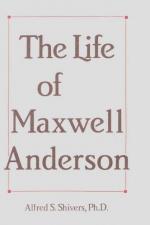|
This section contains 3,335 words (approx. 12 pages at 300 words per page) |

|
SOURCE: Tees, Arthur T. “Maxwell Anderson's Changing Attitude toward War.” North Dakota Quarterly 48, no. 3 (summer 1980): 5-11.
In the following essay, Tees finds evidence in Anderson's canon of his change from an anti-war stance to a less pacifist position later in his life.
Maxwell Anderson, during his thirty-five year career as a playwright, was generally consistent in his treatment of themes. From first to last he was distrustful of government, although he was not, as a critic once characterized him, an anarchist.1 Anderson was ever concerned with individual freedom, from the ill-disciplined independent spirit of Flagg (What Price Glory?) to the concern of Emperor Augustus (The Golden Six) that his citizens had lost their desire for freedom. The playwright's agnosticism also persisted, from Kiper's complaint in What Price Glory? that God, if He existed, did not seem able to do anything about the war, to Stephen Kumalo's wail in...
|
This section contains 3,335 words (approx. 12 pages at 300 words per page) |

|


